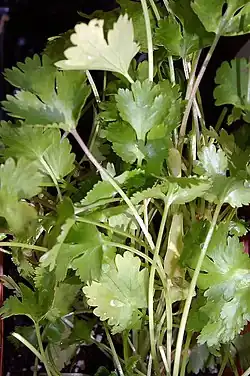كزبرة
Arabic

Alternative forms
Etymology
Borrowed from Aramaic כסברה (kusbara, “coriander”), cognate with Classical Syriac ܟܽܘܣܒܰܪܬܳܐ (kūsbartā, “coriander”), derived from Akkadian 𒊺𒇽 (kisibirru, “coriander”). Likely interrelated with the Sanskrit कुस्तुम्बरी (kustumbarī, “coriander”), perhaps ultimately with a Dravidian origin; compare to Tamil கொத்தமல்லி (kottamalli, “coriander”).
Noun
كُزْبَرَة • (kuzbara) f
- coriander, cilantro
- a. 1165, ابن التلميذ [Ibn al-Tilmīḏ], edited by Oliver Kahl, The Dispensatory of Ibn At-Tilmīḏ الأقراباذين الكبير (Islamic Philosophy, Theology and Science. Texts and Studies; 70), Leiden: Brill, published 2007, →ISBN, page 71 Nr. 77:
- سفوف حب الرمان المقوى للمعدة والأمعاء
حب الرمان وحب الحصرم وحب العنب وحب الآس وخرنوب شامي وخرنوب نطبي وبلوط وكسفرة منقعة في ماء السماق مجففة وسماق من كل واحد جزء قرظ وطراثيث من كل واحد جزء ونصف ثم يحمص الجميع ويدق ويستعمل الشربة ثلاثة دراهم- The pomegranate seed powder which strengthens the stomach and the intestines
Pomegranate seeds, the seeds of unripe grapes, the seeds of (ripe) grapes, myrtle seeds, Syrian carob, Nabataean carob, acorn, dried coriander soaked in sumach-water, and sumach one part of each; babul and desert-thumb one and a half parts of each. All (this) is then roasted, pounded, and a potion (may be made) by using three dirham (of it).
- The pomegranate seed powder which strengthens the stomach and the intestines
- 2018 May 31, “عائلات نازحة تهنأ برمضان في إدلب بعد طول انقطاع رغم الشعور المرير بالغربة”, in AlQuds.co.uk:
- وتقول المرأة السمراء البشرة التي ترتدي عباءة سوداء طويلة “خلال رمضان العام الماضي، كنا نأكل الفجل والبقدونس والسبانخ والكزبرة”، مضيفة “لم نكن قادرين على شراء أي شيء” بسبب الغلاء الفاحش في أسعار المواد الأساسية مثل الأرز والسكر والزيت.
- “During Ramadan last year, we ate radishes, parsley, spinach and coriander," said the woman of brown skin, dressed in a long black plaid, adding “we weren’t able to buy anything” on account of the horrendous increase in prices of staples such as rice, sugar and oil.
Declension
Declension of noun كُزْبَرَة (kuzbara)
| Singular | singular triptote in ـَة (-a) | ||
|---|---|---|---|
| Indefinite | Definite | Construct | |
| Informal | كُزْبَرَة kuzbara |
الْكُزْبَرَة al-kuzbara |
كُزْبَرَة kuzbarat |
| Nominative | كُزْبَرَةٌ kuzbaratun |
الْكُزْبَرَةُ al-kuzbaratu |
كُزْبَرَةُ kuzbaratu |
| Accusative | كُزْبَرَةً kuzbaratan |
الْكُزْبَرَةَ al-kuzbarata |
كُزْبَرَةَ kuzbarata |
| Genitive | كُزْبَرَةٍ kuzbaratin |
الْكُزْبَرَةِ al-kuzbarati |
كُزْبَرَةِ kuzbarati |
Derived terms
- كُزْبَرَةٌ بُسْتَانِيَّةٌ (kuzbaratun bustāniyyatun, “coriander, Coriandrum sativum”)
- كُزْبَرَةُ الْبِئْرِ (kuzbaratu l-biʔri, “black maidenhair fern, Adiantum capillus-veneris”)
- كُزْبَرَةُ الْثَعْلَبِ (kuzbaratu l-ṯaʕlabi, “pimpernel, Sanguisorba minor as also Anagallis arvensis”)
- كُزْبَرَةُ الْحَبَشَةِ (kuzbaratu l-ḥabašati, “yellow germander, Teucrium flavum”)
- كُزْبَرَةُ الْحَمَامِ (kuzbaratu l-ḥamāmi, “common fumitory, Fumaria officinalis”)
- كُزْبَرَةٌ بَرِّيَّةٌ (kuzbaratun barriyyatun, “common fumitory, Fumaria officinalis”)
- كُزْبَرَةُ الْمَلِكِ (kuzbaratu l-maliki, “Fumaria capreolata or Fumaria spicata or Fumaria muralis”)
Descendants
- → Hebrew: כֻּסְבָּרָה
Hijazi Arabic

كُزْبَرَة
Pronunciation
- IPA(key): /kuz.ba.ra/, [kʊz.ba.ra]
See also
- بَقْدونِس (bagdūnis, “parsley”)
This article is issued from Wiktionary. The text is licensed under Creative Commons - Attribution - Sharealike. Additional terms may apply for the media files.